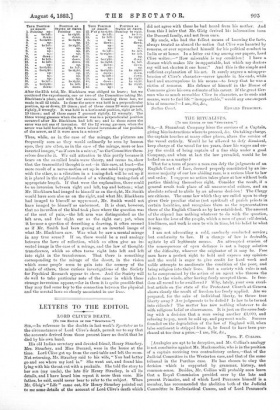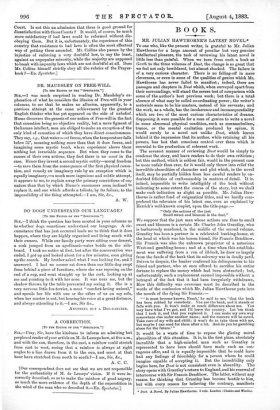THE RITUALISTS.
[To THE EDITOR OF THE " SPECTATOR.") S1R,-A Steamboat Company hires the services of a Captain, giving him iustructions where to proceed, &c. On taking charge, the captain touches at many other places, alters the service of the vessel entirely. Would he be allowed to defy dismissal, keep charge of the -vessel for ten years, draw his wages and en- joy the credit of being captain of a fine ship under a good Company, and when at last the law prevailed, would he be looked on as a martyr ?
That for a terns of years a man can defy the judgments of an English Court of Law, deemed properly constituted by an im- mense majority of our law-abiding race, is a serious blow to law and order. 1 suppose uo action takes place at law without both parties thinking themselves right. Consider the result, if a general revolt took place of all unsuccessful suitors, and an absolute refusal to abide by_an adverse decision ! The Clergy are citizens. The same law which they are called upon to obey gives their peculiar status (not spiritual) of parish priests in certain localities, and recognises them as the representatives there of the English Church as by law established. 'rue amount of the stipend has nothing whatever to do with the question, nor has the love of the people, which a man of great self-denial, kindliness, and work is sure to win in time, let his belief be what it may.
I am not advocating a cold, carelessly conducted service ; but conformity to law. If a change of law is desirable, agitate by all legitimate means. An attempted evasion of the consequences of open defiance is not a happy solution of the difficulty, whoever the originator of it may be. Free men have a perfect right to hold and express any opinion. and the world is eager to give credit for bard work and noble attempts to ameliorate the condition of the poor, and bring religion into their lives. But a society with rules is not to be compromised by the action of an agent who throws the rules to the winds, after having freely accepted them. Is free- dom all round to be swallowed ? Why, lately, your own excel- lent article on the state of the Protestant Church at Geneva shows clearly the result of freedom too freely applied. Are wo prepared, for the sake of individual liberty, to throw true liberty away ? Are judgments to be defied ? is law to be turned into ridicule ? The mutter has now nothing whatever to do with religious belief or observances. It is just on the same foot- ing with a decision that a man owing another £1,000, and refusing to pay, must be sold up, and payment made. Success founded on the degradation of the law of England will, when false sentiment is stripped from it, be found to have been pur- chased at too dear a price.-I am, Sir, &c.,
Tuos. F. COLLINS.
[Analogies are apt to be deceptive, and Mr. Collins's analogy is not conclusive against Mr. Mackonochie, who is in the position of a captain receiving two contradictory orders,-that of the Judicial Committee in the Westerton case, and that of the same tribunal in the Purchas case. He has chosen to obey the decision which is supported by grammar, history, and common-sense. Besides, Mr. Collins will probably soon learn that a Royal Commission presided over by the late and present Primates, and of which Lord Penzance himself is a member, has recommended the abolition both of the Judicial Committee in Ecclesiastical Causes, and of Lord Penzance's
Court. Is not this an admission that there is good ground for dissatisfaction with those Courts ? It would, of course, be much more satisfactory if bad laws could be reformed without dis- obeying them. But it is, unfortunately, the experience of this country that resistance to bad laws is often the most effectual way of getting them amended. Mr. Collins also passes by the injustice of enforcing a very doubtful law, to say the least, against an unpopular minority, while the majority are supposed to break with impunity laws which are not doubtful at all. Does Mr. Collins himself strictly obey all the rubrics of the Prayer- book P—En. Spectator.]



































 Previous page
Previous page